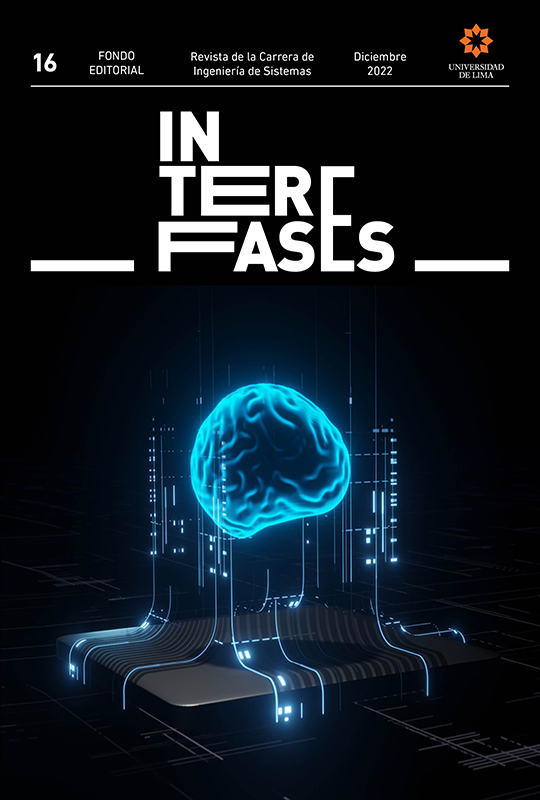Reforzamiento de habilidades aritméticas de fracciones y divisiones en niños de primaria mediante un juego serio educativo
DOI:
https://doi.org/10.26439/interfases2022.n016.6031Resumen
Si bien la matemática resulta fácil para algunos estudiantes, para otros puede ser una verdadera tortura. Sin embargo, con ella uno puede desde organizarse mejor hasta tener mucho más lógica y razonamiento, además de ser el conocimiento base para muchas profesiones. No obstante, a muchos se les complica y no se sienten motivados a aprenderlas o reforzarlas, principalmente, debido a la metodología tradicional, a la dificultad misma de la matemática o la calidad educativa. Por otro lado, la tecnología y los juegos pueden fomentar el aprendizaje, volviéndose el mejor aliado para potenciar la educación. Más aún, para involucrar a los estudiantes en el pensamiento de orden superior, es importante diseñar contextos de juego y misiones que permitan lidiar con problemas prácticos. Por esta razón, el presente artículo pretende apoyar el proceso de reforzamiento del aprendizaje de fracciones y divisiones a través de un juego serio educativo disponible para plataformas web y móvil, que incorpora una mecánica continua y ejercicios de refuerzo de fracciones y divisiones. Para el diseño del juego e interfaces, se aplicaron las heurísticas propuestas por Nielsen (1994), y para la mecánica, el framework MDA, el cual influyó en el diseño de los niveles, junto con las recomendaciones de un focus group. Posteriormente, se validó si hubo cambios en el desempeño de los estudiantes mediante comparación de grupos, así como la usabilidad, con la finalidad de verificar que las heurísticas estén correctamente aplicadas; finalmente, se midió la experiencia del juego en un grupo reducido de escolares a partir de tercero de primaria.
Descargas
Referencias
Aljojo, N. (2018). The design and implementation of a mathematics game-base learning application for primary students. International Journal of Interactive Mobile Technologies, 12(3), 142-152. https://doi.org/10.3991/ijim.v12i3.8739
Alkhateeb, M. A. (2019). Effect of mobile gaming on mathematical achievement among 4th graders. International Journal of Emerging Technologies in Learning, 14(7), 4-7. https://doi.org/10.3991/ijet.v14i07.10315
Aparício, A., & Silva, F. (2019). Arithmetic Bird: a game for training mathematical operations. EAI Endorsed Transactions on Game-Based Learning, 5(17), 1-9. https://doi.org/10.4108/eai.11-7-2019.159526
Bailey, D. H., Hoard, M. K., Nugent, L., & Geary, D. C. (2012). Competence with fractions predicts gains in mathematics achievement. Journal of Experimental Child Psychology, 113(3), 447-455. https://doi.org/10.1016/j.jecp.2012.06.004
Benbow, C. P., & Faulkner, L. R. (2008). Rejoinder to the critiques of the national mathematics advisory panel final report. Educational Researcher, 37(9), 645-648. https://doi.org/10.3102/0013189x08329195
Bicen, H., & Kocakoyun, S. (2018). Perceptions of students for gamification approach: Kahoot as a case study. International Journal of Emerging Technologies in Learning, 13(2), 72-93. https://doi.org/10.3991/ijet.v13i02.7467
Carrol, J. (2013, 3 de septiembre). Applying the MDA game design framework to software. Atomic Spin. https://spin.atomicobject.com/2013/09/03/mda-game-design-framework/
El Azizi, L. (2019). Design and development of a serious mobile game “MathAventure”. International Journal of Advanced Research in Computer and Communication Engineering, 8(9), 16-21. https://doi.org/10.17148/ijarcce.2019.8903
Nah, F. F.-H., Zeng, Q., Telaprolu, V. R., Ayyappa, A. P., & Eschenbrenner, B. (2014). Gamification of education: A review of literature. En F. F.-H. Nah (Ed.), HCI in Business. HCIB 2014. Lecture notes in computer science (vol. 8527, pp. 401-409). Springer.
Gaggi, O., Ciraulo, F., & Casagrande, M. (2018). Eating pizza to learn fractions. En ACM International Conference Proceeding Series (pp. 220-225). https://doi.org/10.1145/3284869.3284921
Hunicke, R., Leblanc, M., & Zubek, R. (2004). MDA: A formal approach to game design and game research.
Ibarra, M. J., Jiménez, W., Soto, C., Chavez, E., Chicclla, E., Sprock, A. S., & Brandao, L. O. (2019). Game based learning for math learning: iFractions case study. En Proceedings - 2019 International Conference on Virtual Reality and Visualization (ICVRV) (pp. 208-211). https://doi.org/10.1109/ICVRV47840.2019.00050
Ibarra, M. J., Soto, W., Ataucusi, P., & Ataucusi, E. (2016). MathFraction: Educational serious game for students motivation for math learning. En Proceedings - 2016 11th Latin American Conference on Learning Objects and Technology (LACLO) (pp. 1-9). https://doi.org/10.1109/LACLO.2016.7751777
Jsselsteijn, W. A., De Kort, Y. A. W., & Poels, K. (2008). The Game Experience Questionnaire. Technische Universiteit Eindhoven.
Johnson, D., Gardner, M. J., & Perry, R. (2018). Validation of two game experience scales: The Player Experience of Need Satisfaction (PENS) and Game Experience Questionnaire (GEQ). International Journal of Human Computer Studies, 118, 38-46. https://doi.org/10.1016/j.ijhcs.2018.05.003
Kebritchi, M., Hirumi, A., & Bai, H. (2010). The effects of modern mathematics computer games on mathematics achievement and class motivation. Computers & Education, 55(2), 427-443. https://doi.org/10.1016/j.compedu.2010.02.007
Kickmeier-Rust, M. D., Hillemann, E. C., & Albert, D. (2014). Gamification and smart feedback: Experiences with a primary school level math app. International Journal of Game-Based Learning, 4(3), 35-46. https://doi.org/10.4018/ijgbl.2014070104
Lankoski, P., Björk, S., & Stirling, W. C. (2003). Game research methods. En Satisficing games and decision making: With applications to engineering and computer science (p. 9). ETC Press.
Ministerio de Educación del Perú. (2018). Perú: ¿cómo vamos en educación? Estadística de la Calidad Educativa. http://repositorio.minedu.gob.pe/handle/MINEDU/6104
Mishra, L. (2020). Conception and misconception in teaching arithmetic at primary level. Journal of Critical Reviews, 7(5), 936-939. https://doi.org/10.31838/jcr.07.05.192
Mora-Zamora, R., & Brenes-Villalobos, E. (2019). Integrated framework for game design. En Proceedings of the IX Latin American Conference on Human Computer Interaction (CLIHC ‘19) (Article 23, pp. 1-6). https://doi.org/10.1145/3358961.3358984
Muñoz Sanabria, L. F., & Vargas Ordoñez, L. M. (2019). EDUMAT: herramienta web gamificada para la enseñanza de operaciones elementales. Campus Virtuales, 8(2), 9-17.
Murtiyasa, B., Jannah, I. M., & Rejeki, S. (2020). Designing mathematics learning media based on mobile learning for ten graders of vocational high school. Universal Journal of Educational Research, 8(11), 5637-5647. https://doi.org/10.13189/ujer.2020.081168
Naiser, E. A., Wright, W. E., & Capraro, R. M. (2003). Teaching fractions: Strategies used for teaching fractions to middle grades students. Journal of Research in Childhood Education, 18(3), 193-198. https://doi.org/10.1080/02568540409595034
Nielsen, J. (1994, 24 de abril). 10 usability heuristics for user interface design. Nielsen Norman Group. https://www.nngroup.com/articles/ten-usability-heuristics/
Ninaus, M., Kiili, K., McMullen, J., & Moeller, K. (2017). Assessing fraction knowledge by a digital game. Computers in Human Behavior, 70, 197-206. https://doi.org/10.1016/j.chb.2017.01.004
Obersteiner, A., Van Dooren, W., Van Hoof, J., & Verschaffel, L. (2013). The natural number bias and magnitude representation in fraction comparison by expert mathematicians. Learning and Instruction, 28, 64-72. https://doi.org/10.1016/j.learninstruc.2013.05.003
Olsen, T., Procci, K., & Bowers, C. (2011). Serious games usability testing: How to ensure proper usability, playability, and effectiveness. En A. Marcus (Ed.), Design, user experience, and usability. Theory, methods, tools and practice. DUXU 2011. lecture notes in computer science (vol. 6770, pp. 625-634). https://doi.org/10.1007/978-3-642-21708-1_70
Procci, K., Chao, A., Bohnsack, J., Olsen, T., & Bowers, C. (2012). Usability in serious games: A model for small development teams. Computer Technology and Application, 3(2012), 315-329.
Robertson, J., & Howells, C. (2008). Computer game design: Opportunities for successful learning. Computers & Education, 50(2), 559-578. https://doi.org/10.1016/j.compedu.2007.09.020
Sauro, J., & Lewis, J. R. (2016). Standardized usability questionnaires. En Quantifying the user experience (2.a
ed., pp. 185-248). Elsevier. https://doi.org/10.1016/b978-0-12-802308-2.00008-4
Schenke, K., Rutherford, T., & Farkas, G. (2014). Alignment of game design features and state mathematics standards: Do results reflect intentions? Computers & Education, 76, 215-224. https://doi.org/10.1016/j.compedu.2014.03.019
Shang, J., Zhang, L., Hu, R. N., Ma, S. J., Zen, J. L., Yuan, M. Z., & Sun, J. G. (2018). How to support fraction learning with math game “Run Fraction”: Theory, design and application. En Proceedings of International Conference on Computers in Education (Extended Summary Proceedings) (pp. 20-22). The Ateneo de Manila University.
Spieler, B., & Girvan, C. (2020). Das PECC-Framework: Gender-Sensibilität und spielerische Programmierung in der informatischen Grundbildung. En R. Zender, D. Ifenthaler, T. Leonhardt & C. Schumacher (Eds.), DELFI 2020 – Die 18. Fachtagung Bildungstechnologien der Gesellschaft für Informatik e. V. (pp. 247-258). Gesellschaft für Informatik e. V.
Spieler, B., & Kemeny, F. (2020). Design, complexity, and coding: A framework to evaluate games. En Proceedings of the 14th International Conference on Game Based Learning (ECGBL) (pp. 558-566). https://doi.org/10.34190/GBL.20.156
UX Research. (2017). Measuring and interpreting System Usability Scale (SUS) - UIUX Trend. UIUXTrend. https://uiuxtrend.com/measuring-system-usability-scale-sus/
Vandercruysse, S., Maertens, M., & Elen, J. (2015). Description of the educational math game “Monkey Tales: The Museum of Anything”. En J. Torbeyns, E. Lehtinen & J. Elen (Eds.), Describing and studying domain-specific serious games (pp. 24-43). https://doi.org/10.1007/978-3-319-20276-1
Wang, S. Y., Chang, S. C., Hwang, G. J., & Chen, P. Y. (2017). A microworld-based role-playing game development approach to engaging students in interactive, enjoyable, and effective mathematics learning. Interactive Learning Environments, 26(3), 411-423. https://doi.org/10.1080/10494820.2017.1337038
Zhang, L., Shang, J., Pelton, T., & Pelton, L. F. (2020). Supporting primary students’ learning of fraction conceptual knowledge through digital games. Journal of Computer Assisted Learning, 36(4), 540-548. https://doi.org/10.1111/jcal.12422
Publicado
Número
Sección
Licencia
Los autores/as que publiquen en esta revista aceptan las siguientes condiciones:
Los autores/as conservan los derechos de autor y ceden a la revista el derecho de la primera publicación, con el trabajo registrado con la licencia de atribución de Creative Commons, que permite a terceros utilizar lo publicado siempre que mencionen la autoría del trabajo y a la primera publicación en esta revista.
Los autores/as pueden realizar otros acuerdos contractuales independientes y adicionales para la distribución no exclusiva de la versión del artículo publicado en esta revista (p. ej., incluirlo en un repositorio institucional o publicarlo en un libro) siempre que indiquen claramente que el trabajo se publicó por primera vez en esta revista.
Se permite y recomienda a los autores/as a publicar su trabajo en Internet (por ejemplo en páginas institucionales o personales) antes y durante el proceso de revisión y publicación, ya que puede conducir a intercambios productivos y a una mayor y más rápida difusión del trabajo publicado (vea The Effect of Open Access).
Última actualización: 03/05/21






